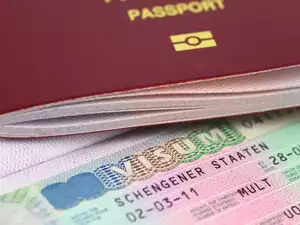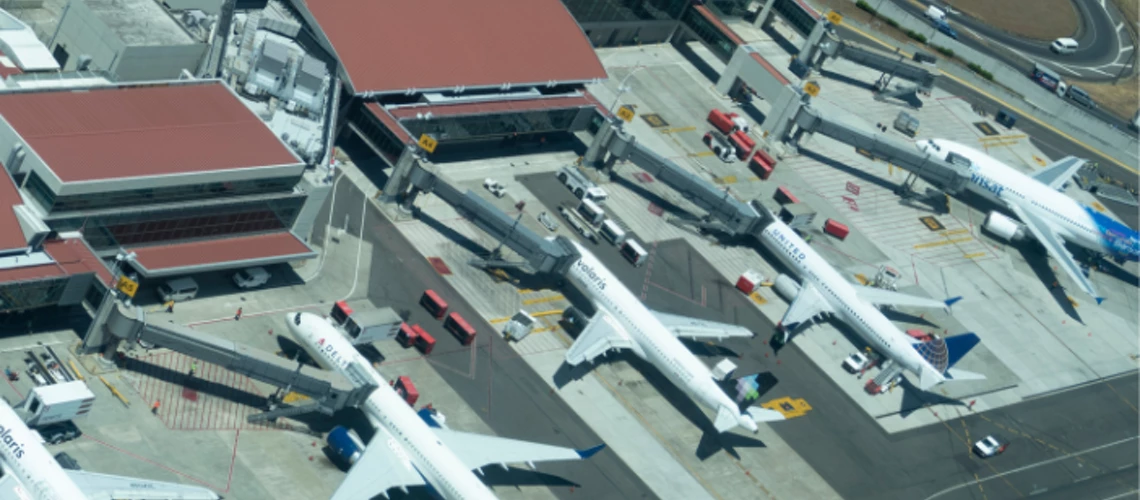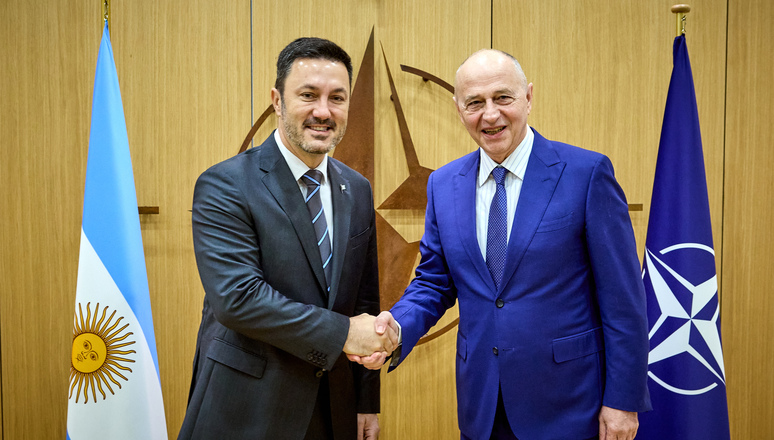Escape Artist’s Weekly Global News Roundup
Welcome to the Escape Artist Weekly Global News Roundup. From Argentina’s grappling with its economic policies and the resulting impacts on its prosperity to the draw of new frontiers for digital nomads seeking vibrant, yet affordable lifestyles in places like Colombia and Türkiye. We explore the complexities of international mobility, highlighted by Schengen visa delays that are currently testing the patience of many travelers to Europe. Additionally, we look at innovative approaches to economic challenges, such as Central America’s exploration of more affordable air travel to foster regional integration. We highlight these stories and more, impacting your global outlook.
How Statism Destroyed Argentina

Once a beacon of economic prosperity, Argentina has tumbled from its high perch, now grappling with poverty and severe inflation. But how did a country that stood among the wealthiest by GDP per capita in the late 19th century plummet so drastically? The recent piece on Mises.org, “How Statism Destroyed Argentina,” dives deep into this question, tracing the roots of Argentina’s decline through the lens of statist policies and their deep-seated impact.
Could the collective policies implemented by successive governments be the main culprit in eroding Argentina’s economic standing? The article explores this notion by highlighting the transition from a market-driven economy to one stifled by bureaucracy and regulation. This shift not only hindered entrepreneurial ventures but also paved the way for inefficiency and corruption within state-controlled sectors such as public media, transportation, and energy.
In an engaging exploration, the piece also draws parallels with Ludwig von Mises’s seminal work, Human Action, using it as a framework to discuss the battle between individualism and collectivism in economic policies. It questions whether the current push towards free-market reforms under the administration of Javier Milei could signal a turning point for Argentina.
As the country stands at a crossroads, one must ask: Will Argentina reclaim its lost economic glory, or is the grip of statism too strong to break? What lessons can other nations draw from Argentina’s economic saga?
Read the full story here.
Planning To Travel To Europe? Schengen Visa Delays Could Be A Hindrance

iStock
Dreaming of the European summer’s allure? Many travelers are, but they face a major roadblock: unprecedented delays in Schengen visa processing. As reported by The Economic Times, securing a visa appointment is becoming a Herculean task, with wait times extending up to three months, especially for those planning trips to Scandinavian countries.
Experience the Insider community that takes your international lifestyle to the next level. Download your FREE guide
"18 Steps to Implementing Your Plan B" instantly!
What should be a straightforward procedure is turning into a saga of frustration. Even those who submit their applications as early as April find themselves caught in a bottleneck, unable to secure appointments. The stringent documentation requirements do nothing but add to the chaos, leaving many to question whether their travel plans will have to be shelved.
Is this prolonged waiting period just a temporary glitch, or a symptom of a deeper problem in the Schengen visa processing system? How are these delays affecting the travel and tourism industry, particularly during the high season? And what alternatives are travelers considering to bypass these roadblocks?
Read the full story here.
Digital Nomads Are Flocking To Colombia

The city of Medellín, seen at night. While some locals welcome the economic contributions from the influx of remote workers, others fear they’re being priced out. Catherine Ellis/BBC
Medellín, Colombia, once notorious as the epicenter of narcotics trafficking, has transformed into a buzzing hub for digital nomads from around the globe. What draws these remote workers to swap their familiar home offices for the vibrant streets and cafés of Medellín? The allure lies in the city’s scenic surroundings, hospitable culture, and, importantly, its affordability. However, this influx is not without its complications.
As the digital nomad community flourishes, local dynamics shift. Rental prices in Medellín have skyrocketed, increasing by up to 80% in some neighborhoods, making housing less accessible for local residents. The city’s economic landscape is evolving too, benefiting some businesses like fruit vendors and Uber drivers who see these nomads as a boon to their income. Yet, as prices rise, the question arises: Is Medellín experiencing a new form of gentrification, one that privileges international remote workers at the expense of local middle and upper-middle-class families?
This transformation sparks a series of pressing questions: What are the long-term consequences of this new demographic trend? How can cities like Medellín manage growth in a way that benefits both local and expatriate populations? And what policies could be implemented to ensure that the digital nomad wave doesn’t wash away the cultural and economic fabric of these emerging urban favorites?
Read the full story here.
Türkiye Rolls Out Digital Nomad Visa: Eligibility Criteria And All That You Need To Know

Türkiye rolls out Digital Nomad Visa: Eligibility criteria and all that you need to know © Provided by The Times of India
As the pull of living and working from anywhere continues to captivate the global workforce, Türkiye is stepping into the spotlight with its new Digital Nomad Visa, designed to attract remote workers from around the world. This innovative visa program aligns Türkiye with other European destinations like Italy and Spain, which have similarly embraced the digital nomad trend.
But what sets Türkiye’s program apart? Applicants must meet specific criteria, including holding a university degree and demonstrating an annual income of at least $36,000. This strategic move is poised to bring well-educated and financially stable professionals to Türkiye’s shores. Imagine working remotely from the historic backdrop of Istanbul, the stunning landscapes of Cappadocia, or the coastal vistas of Antalya.
How will this visa change the demographics and economy of Türkiye? What impact will an influx of international remote workers have on local communities and cultural dynamics? And how does Türkiye plan to compete with other countries that are vying for the same global remote workforce?
Read the full story here.
Great Cost-Of-Living Escape: Aussie Flees ‘Impossible’ Housing Crisis To Buy Home And Now Saves Thousands

Mohamed Yousuf has found the cost of living to be much cheaper in Malaysia, compared to Australia. (Source: Supplied)
Faced with Sydney’s soaring living costs and a seemingly unreachable dream of homeownership, Mohamed Yousuf took a bold step many only ponder: he relocated overseas. His destination? Kuala Lumpur, Malaysia, where the cost of living allowed him not only to save money but also to invest in property—a dream slipping away from many young Australians.
Why did Yousuf find Malaysia more accommodating to his financial and lifestyle goals? Compared to Sydney, where his expenses soared to nearly $4,000 monthly, Kuala Lumpur offers a significantly cheaper cost of living—around $1,350 per month, allowing Yousuf to save thousands. He capitalized on these savings by buying a three-bedroom apartment in the city center for $300,000—half the average price of a unit in Australia’s capital cities.
What does Yousuf’s story tell us about the broader economic pressures facing Australians, especially the younger generation? As the gap between income and housing costs widens in Australia, will more young professionals like Yousuf look abroad to achieve financial stability and homeownership? And what impacts might this trend have on Australia’s economy if the brain drain becomes a more common solution to domestic affordability crises?
Read the full story here.
Affordable Air Travel In Central America To Enhance Regional Integration

Aerial view of San Jose airport in Costa Rica. Photo: Adobe Stock.
Are soaring travel costs hindering Central America’s economic integration and growth? A recent World Bank study highlights the stark disparity in airfare prices within the region compared to its South American neighbors, revealing a critical barrier to enhancing regional connectivity and economic opportunities.
Currently, a one-hour flight across Central America can cost a traveler between $500 and $800—a sharp contrast to the cheaper air travel available within Brazil, Mexico, and Colombia. The study attributes these high costs largely to hefty airport fees and limited competition among airlines. For instance, intraregional travel fees are comparable to those charged for international flights from overseas, significantly inflating the cost of tickets within Central America.
But what if these barriers were removed? The World Bank suggests that reducing these fees could slash round-trip travel costs to as little as $114, potentially opening up a market of 50 million consumers to local businesses and boosting the tourism sector, which is vital for many of the region’s economies. Efforts are already underway, with countries like Panama and Costa Rica initiating fee reductions.
Could these policy changes transform Central America into a more cohesive economic entity? What would be the impact on small and medium enterprises and the broader economic landscape if intraregional travel became as affordable as it is in other parts of the world?
Read the full story here.
Argentina Takes First Step Toward NATO Partnership

Argentina is taking significant steps towards strengthening its international security relations by moving closer to a partnership with NATO. During a recent meeting at NATO headquarters, Argentine Defense Minister Luis Petri and NATO Deputy Secretary General Mircea Geoană discussed the potential benefits of this partnership, emphasizing mutual interests in promoting peace and stability.
This dialogue marks a pivotal moment for Argentina, which has historically contributed to NATO’s peace support operations in regions such as Bosnia and Herzegovina and Kosovo. However, any formal partnership will require the consensus of all 32 NATO member countries. Currently, Colombia stands as the only Latin American country partnered with NATO, setting a precedent for potential future alliances in the region.
What does this proposed partnership mean for the geopolitical landscape of Latin America? How might Argentina’s closer ties with NATO influence its regional and global diplomatic relations? And what are the strategic benefits for NATO and Argentina in this potential alliance? These questions highlight the complexities and significant implications of Argentina’s move towards integrating more deeply into global security frameworks, reflecting both opportunities and challenges ahead.
Read the full story here.
 Dan is passionate about creating stories that help people discover and navigate unique perspectives and better understand the world around them. Aside from writing, Dan is an avid amateur marathon runner.
Dan is passionate about creating stories that help people discover and navigate unique perspectives and better understand the world around them. Aside from writing, Dan is an avid amateur marathon runner.Like Our Articles?
Then make sure to check out our Bookstore... we have titles packed full of premium offshore intel. Instant Download - Print off for your private library before the government demands we take these down!






